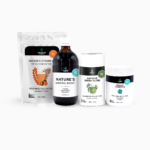I was invited to go on a business trip to the Solomon Islands by Kirsty Wirth, founder of Kultured Wellness. Kirsty is working with a company called Kokonut Pacific, run from the Solomon Islands but owned by an Australian business.
When oil is pressed out of the coconut meat, it’s known as virgin coconut oil. This is done by many villages in the Solomon Islands under Kokonut Pacific’s social enterprise scheme. This coconut oil is a vastly superior product to the refined, sanitised and deodorised coconut oil made from copra (the dried meat or kernel of the coconut).
It was wonderful to visit a village on Savo, one of the islands, which makes the coconut oil, as well as the headquarters of Kokonut Pacific in Honiara.
Kirsty’s business uses coconut products, mainly the coconut water and the coconut cream. With these products she makes wonderful pre- and probiotics using specific strains of bacteria to help with gut health.
The Health Crisis in the Solomon Islands
One of the waste products of coconut oil production is the coconut water (it’s thrown on the ground). Another product easily made from coconuts is coconut cream. Kirsty proposed that instead of throwing the water away, it could be fermented, along with the coconut cream, to help with nourishment of not only the gut but the whole body.
The Solomon Islands for the most part is in a health crisis. Chronic disease is growing, especially diabetes and the severe consequences of that disease. Some children are also malnourished with wasting disease being a prominent topic of conversation while we were visiting the paediatric ward of the local hospital. Kirsty and I had a chance to speak to paediatricians and the head of the hospital, as well as at the university and to the Ministry of Health.
We heard about a supplement that was being fed to children six months and older for severe acute malnutrition. The product was made in India by Nutrivita Foods as a franchise of Nutriset.
Nutriset was founded by Michel Lescanne in 1986, his focus being research in the field of humanitarian nutrition, developing solutions for malnutrition and acting as an interface between the worlds of humanitarian aid, nutritionists and food industry technologies. In 1996, Nutriset partnered with Andre Briend, a French paediatric nutritionist, to create Plumpy Nut, the first ready-to-use therapeutic food (RUTF) for treatment of severe malnutrition. Their main clients are the United Nations and other NGO’s like Oxfam and UNICEF.
The paste comes in a 92g, 500 calorie, coloured plastic sachet. The product has an IP – that is, it has been patented. Its ingredients are as follows: peanuts, sugar, skimmed milk powder, vegetable oils (rapeseed [canola], palm, soy in varying proportions), stabiliser (fully hydrogenated vegetable fat), mono and diglycerides, vitamin and mineral complex. This is a completely sterile food. The fat is 30%, carbohydrates 45% and protein 25%. It has a shelf life of two years. Powders were once used for the purpose of malnutrition but there were often issues with unsanitary water (water was needed to dilute the powder), which contaminated the powder and caused diarrhea. So, RUTF was born.
This RUTF is sold in boxes of 150 sachets at a cost of US$60, just under $100 Australian or $400 Solomon, costing 66 cents (Aussie) for one sachet. The prescription would be three sachets a day with no other food in order to rectify acute severe malnutrition, which will take six to eight weeks. This is a cost of just under two dollars a day. The measure of successful treatment is weight gain. However, in Australia and around the world there are malnourished obese children, so I’m not sure if this a great predictor for health nor nourishment.
While I understand the reason for the product, I just can’t see how this can promote health in a severely malnourished child. Yes, calories will put on weight, but as I’ve always said, a calorie is not necessarily a calorie. 500 calories of nutrient -dense food is vastly different to 500 calories of white sugar. I also understand the importance of RUTF if food is not available, but this is not the case in the Solomon Islands – it has an abundance of food.
The Quality of Local Foods
I’d love to see a RUTF containing clean peanuts and clean healthy fats, and a fermented carbohydrate that still holds vital nutrients, rather than refined, GM, sprayed, hydrogenated oils and fats. We know that a healthy microbiome means that we have an abundance of B vitamins, vitamin K, aromatic amino acids to make neurotransmitters, as well as enterobactin – an iron carrier. Therefore, there is less need for synthetic vitamins and mined minerals.
The vitamin and mineral complex in Plumpy Nut is basic (as you can see here). In an emergency, supplements are a good way to administer micronutrients. However, quality would always be my pick. When you consider that coconut flesh is highly nutritious, rich in fibre, vitamins C, E, B1, B3, B5 and B6 and minerals including iron, selenium, sodium, calcium, magnesium and phosphorous, then we have an amazing food to enhance health, without having to import RUTF. Also, by using local foods locally sourced, we then boost the economy. The knock on effect of that leads to more funds for more information about food security and food health.
Kultured Wellness and Kokonut Pacific have proposed to the local authorities and the Australian Department of Foreign Affairs and Trade (DFAT) to use local products, such as coconut water and coconut cream, to make coconut kefir and coconut yogurt to help improve the health and wellbeing of malnourished children in the Solomon Islands.Being on islands with an abundance of coconuts means that the processing of the coconut water, meat, flesh and oil is minimal, which ensures the coconut retains all its original nutrition. By fermenting it, everything is enhanced. It gives me goosebumps thinking about an absolutely perfect local food. Kirsty proposed a clinical trial to the Solomon Islands’ Ministry of Health. Ethical approval will have to be sort, but I look forward to telling you in the future that the trial is proceeding.
Change May Be Slow, But Needed
When we have all the facts we can make better choices. Change takes time but I’m hoping with Kultured Wellness and Kokonut Pacific that the choices for diabetes and malnutrition in the Solomon Islands will change. And perhaps in other parts of the world. I know if I tried to feed myself on two dollars a day that the quality would not be there. The only way we can create cheap food is with cheap ingredients, but the true cost of the cheap ingredients are not necessarily the cost of the food itself.
I may be an idealist, but creating an awareness and perhaps even slow progress may turn this around. The Solomon Islands are abundant in natural resources – the markets I visited were filled with tubers, coconuts, fish, greens and fruit galore. It’s not like there is no food, it is everywhere; on the sides of the road food is growing wild.
Savo had abundant fish, root vegetable gardens with potato, taro and things I’d never heard of, as well as the biggest green garden I’ve ever seen. But rice has also snuck into the community and I saw a few malnourished children with big tummies. It seems rice is their staple, not the traditional foods of their culture. Rice is considered food security by some islanders. If a man catches a fish, he will sell that fish to buy rice to feed his family. Rice is not grown in the Solomon Islands – it must be imported, like Plumpy Nut.
This is not only happening in the Solomon Islands…I see it in Australia too. Quality food from regenerative farming practices is seen as fringe and hippy, while food replacement shakes and protein powders filled with dubious ingredients are seen as scientific.
My husband wrote something on his white board recently: “Humans dig their graves with their forks”. I hope that you are not doing that. I hope that you have come to the realisation that we must get back into the kitchen to feed and nourish our families to heal this nation.
I’m so grateful to Kirsty for inviting me to a very eye-opening four days in Honiara, along with Kokonut Pacific, the board members and DFAT. I immersed myself in a beautiful culture and realised that a food revolution has to begin in order to change the health of humans and the planet.
.








0 Comments